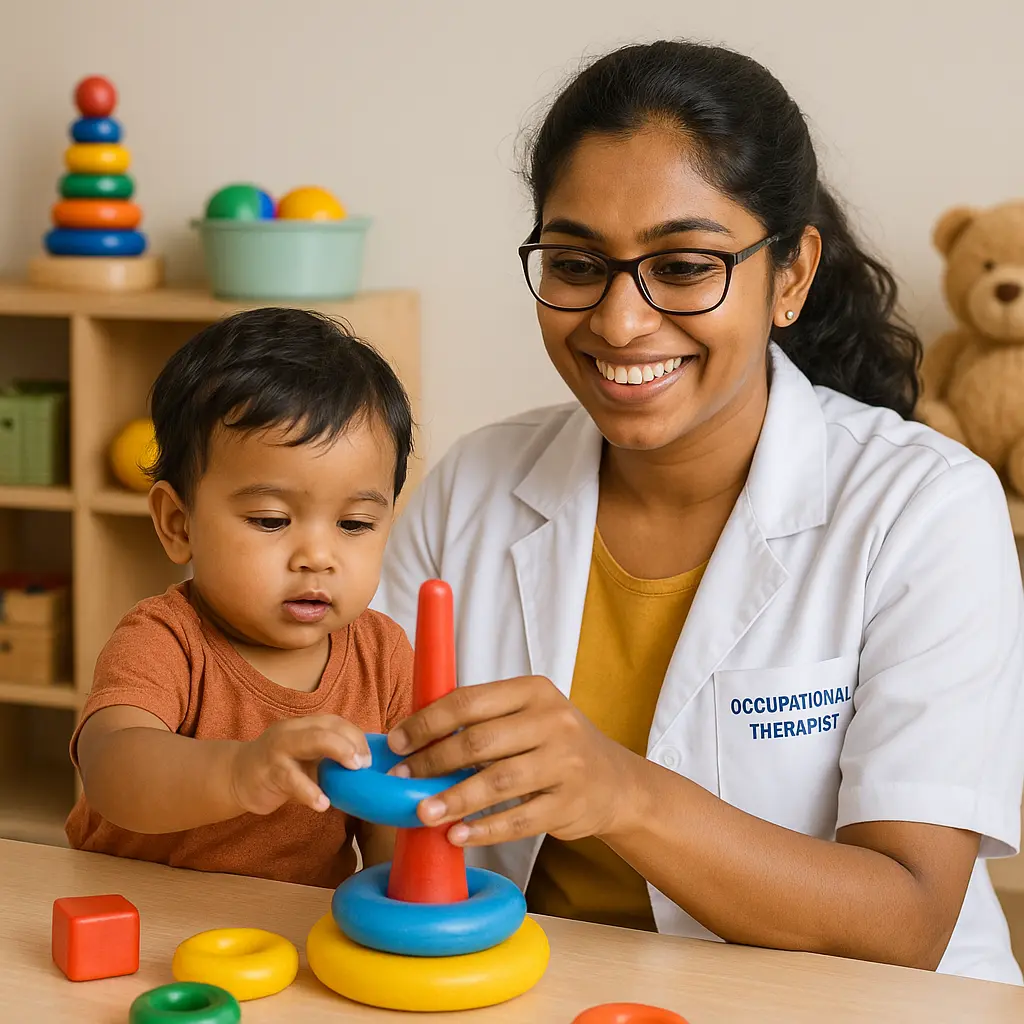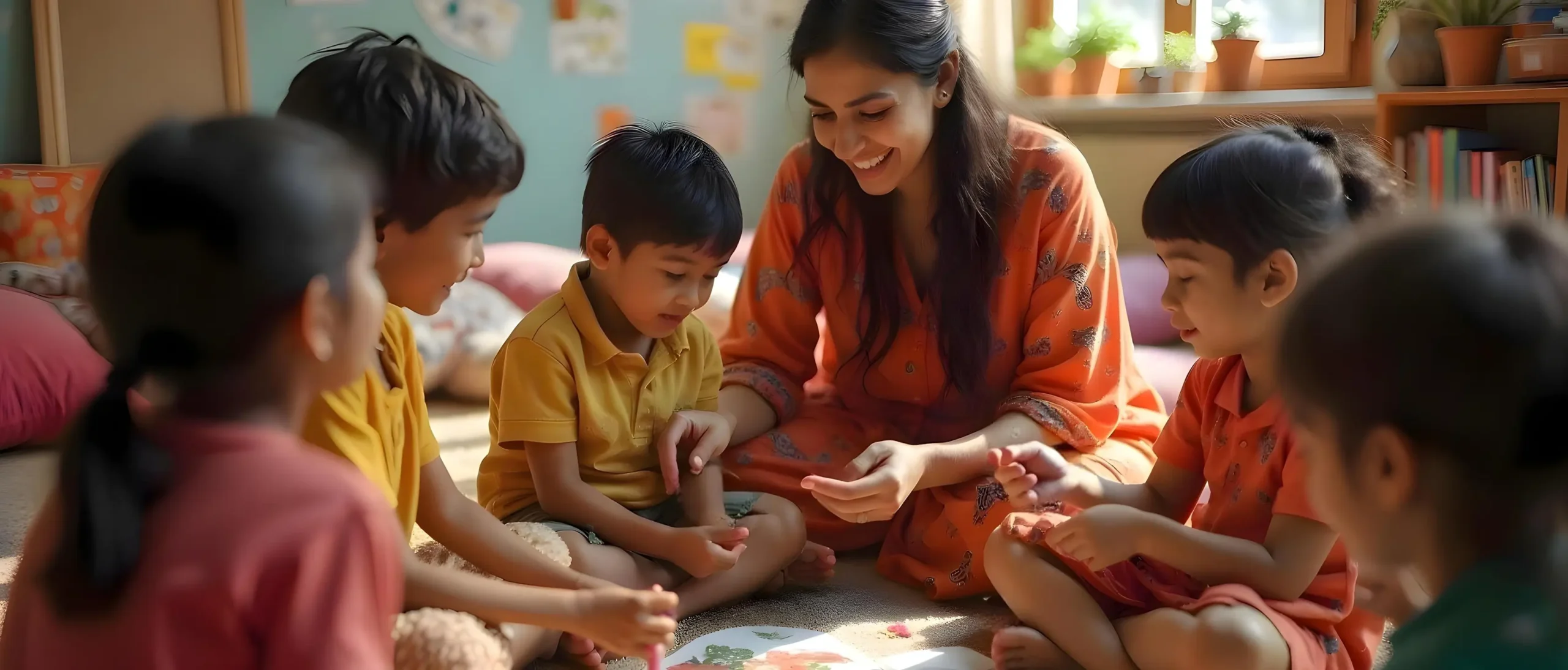“When we know better, we do better.” — Maya Angelou
I once noticed a child within my own family walking on his toes. I gently told the parents, “Just keep an eye on it.” What followed wasn’t curiosity, but a wave of worry, quiet defensiveness, and subtle pulling away. That moment stayed with me.
Over time, I’ve realised conversations about child development—milestones, red flags, delays— can feel deeply personal. For many parents, hearing that something might be different stirs up fear, not just about the child, but about what it says about their parenting. It’s not indifference—it’s protection, love, uncertainty.

This is where occupational therapy (OT) can be a quiet ally. Early childhood intervention through OT doesn’t try to “fix” children or label them—it seeks to understand them. It offers gentle, meaningful ways to help children engage with the world: to move, play, communicate, self-regulate, and participate in daily life with more ease.
Occupational therapy in early childhood isn’t about fixing a child. It’s about giving them the tools to thrive—and giving families the confidence to help them do so.
It is about equipping children with the tools they need to thrive—and just as importantly, equipping families with the reassurance and strategies to support them with confidence and hope.
What is Occupational Therapy in Early Childhood?
Occupational therapy, as the name suggests, is targeted towards helping people perform their daily occupations independently and proficiently. For young children, these “occupations” aren’t jobs—they’re the everyday activities that shape their growth: holding a crayon, climbing stairs, getting dressed, feeding themselves, playing with peers, or following a simple routine. These may seem small, but for a child in their early years, they’re the building blocks of independence, confidence, and connection.

There are different types of occupational therapy; one where therapists specialise in working with children is called Pediatric occupational therapy. It focuses on helping children gain independence and develop life skills through therapeutic activities like sensory integration that address delays or difficulties. OT sessions are often play-based but grounded in scientific principles to improve areas such as:
● Fine motor skills (e.g., using fingers to grasp a crayon)
● Sensory processing (e.g., reacting appropriately to sounds or textures)
● Self-help skills (e.g., dressing, feeding)
● Emotional and behavioral regulation (e.g., accepting and labelling emotions)
● Visual-motor integration (e.g., hand-eye coordination)
This therapy is tailored to the child’s individual needs and developmental stage, making it a cornerstone of comprehensive early childhood intervention programs.
Why Early Childhood Intervention?
There is an upward trend towards teaching skills early, and that’s true for children missing out on milestones too. Present research suggests that early childhood intervention can significantly improve developmental trajectories. Most of this research talks about the following, when indicating the importance of acting early:
● Maximizing Brain Plasticity: The brain is most adaptable during early childhood,
specifically ages 0-5, allowing greater improvements in function.
● Reducing the Need for Intensive Future Support: Early occupational therapy can
reduce the severity of developmental issues, making transitions to school smoother.
● Improving Quality of Life: Early child intervention leads to enhanced functional
skills, which in turn increase independence and confidence of children.
● Strengthening Parent-Child Bond: Involving parents in therapy builds connection
and responsiveness.
Not only does occupational therapy in early childhood help children catch up with milestones and perform better at their daily living functions, but also become better equipped to manage school routines, build peer relationships, and express themselves effectively.
Early Intervention Services include:
● family training, counseling, and home visits
● special instruction
● occupational therapy
● service coordination services
● early identification, screening, and assessment services
● assistive technology devices and assistive technology services
Occupational Therapy Process
As we’ve discussed occupational therapy for children, it is also essential to understand the process of therapy followed by Occupational Therapists.
Mostly, parents find themselves guided by their pediatrician or family physician on matters of Early Interventions and their importance during early childhood.
After getting recommended to an occupational therapist, a thorough evaluation is carried out by a specialised team. This is done to rule out the presence of any other difficulties or get a better understanding of how to support the child holistically. Even though this isn’t set in stone, however, as research is expanding on therapeutic support for children, collaboration is getting its due credit. When professionals and families work in sync, the child receives more cohesive and meaningful intervention.

Once the assessment is completed, the occupational therapist formulates an Individualized Intervention Plan (IIP) or a Treatment Plan that targets specific developmental goals. These goals often focus on enhancing the child’s participation in age-appropriate “occupations” such as play, self-care routines, social interaction, and early learning skills.
The therapeutic journey is dynamic and may involve:
● One-on-one therapy sessions, typically once or twice a week
● Home programs, where caregivers are trained to support the child between sessions
● Sensory integration activities for children with sensory processing differences
● Adaptive strategies and tools to aid participation in daily routines
● Regular monitoring and review, ensuring the plan evolves with the child’s progress
Importantly, occupational therapy is not just about correcting delays—it’s about building independence, nurturing self-confidence, and empowering children and families. With timely support and consistent follow-through, children can experience meaningful improvements in their daily functioning and overall quality of life. For more information on the intensity of sessions and therapeutic outcomes, please check out the blog on Navigating Healthcare-Steps Ahead.
How Kidable Can Help
We know the feeling of being constantly worried about your child not catching up to age-appropriate milestones and not knowing what to do next. At Kidable, we support families right from the start—whether it’s a toddler still learning to walk, not able to maintain balance, or an older child who’s struggling with fine motor skills. You don’t have to wait because waiting doesn’t bring answers – early action does! And we take you from waiting and confusion, to answers and actionable steps.
Here’s how Kidable supports your child through OT:
● Developmental & Sensory Screening (starting as early as 18 months) to identify fine motor delays, sensory sensitivities, or difficulties with routines.
● Function-first and individualised goals that matter in real life—like holding a spoon, sitting through a story, tying shoelaces, or participating in play.
● Certified Specialists trained in neurodiversity-affirming practices who understand that every child learns and experiences the world differently
● Individualized intervention plans, built around your child’s sensory profile, developmental needs, and unique interests—not a one-size-fits-all approach
● Parent coaching to help you understand your child’s signals, support regulation, and make everyday tasks feel more doable—for you and your child
● School readiness and classroom participation support—so your child doesn’t just manage school but feels seen, included, and confident to take part
● Ongoing progress monitoring with room to adapt—because we grow as your child grows
Because when children receive timely, developmentally-appropriate Occupational Therapy support, they don’t just catch up—they build skills that last, gain confidence in their bodies, and begin to navigate the world with greater ease and independence.
Let us support you through every step.
Contact us: reachout@kidable.in or +91-9266688705
Merlin Joseph
founder
Wellness Coordinator at KidAble who believes mental health should be a child’s foundation, not an afterthought. She brings empathy and insight to every session, helping young minds build confidence, expression, and emotional balance.

